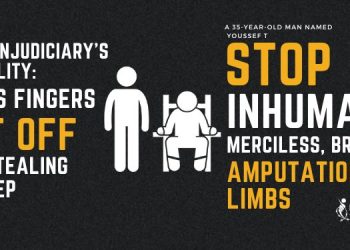The public flogging sentence for a man was carried out yesterday in the city of Ahvaz, the capital of southwestern Khuzestan province.
A footage circulated on the Internet showed the man being punished with public lashes.
Simultaneously, his verdict is being read out loud which indicates that Branch 115 of the city’s Criminal Court had sentenced the man to four years behind bars and 74 lashes for robbery.
Locals showed their hatred of the brutality by refusing to gather at the scene.
Iran does not consider flogging as torture or an inhumane punishment and uses it to “set an example”.
The chairman of the Parliament’s Committee on Industries and Mines recently encouraged the use of flogging and execution for “economic offenders”.
“If two people are thoroughly flogged and if two people are executed in a timely manner for controlling the market, it will be a lesson for everyone else,” Aziz Akbarian said in an interview with the state-run Alborz Radio in late December 2018.
More than 100 “offences” are punishable by flogging under Iranian law. The offences include theft, assault, vandalism, defamation and fraud. They also cover acts that should not be criminalized, such as adultery, intimate relationships between unmarried men and women, “breach of public morals” and consensual same-sex sexual relations.
Iranian officials have carried out various forms of cruel punishments in 2018, including amputating a man’s hand for stealing.
According to Amnesty International’s Philip Luther, “The use of cruel and inhuman punishments such as flogging, amputation and blinding are an appalling assault on human dignity and violate the absolute prohibition on torture and other degrading treatment or punishment under international law.”
“It’s unacceptable Iranian authorities allow such punishments and to justify them in the name of protecting religious morals.”











